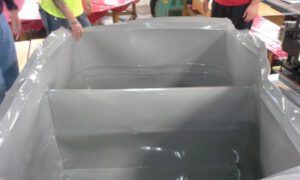 Tank lining material directly impacts the quality of the stored material. Selecting incompatible materials can lead to premature liner failures and cause issues that will result in higher costs. In severe cases, environmental contamination can occur. For example, in 2018, a chemical plant in Texas faced significant fines and shutdowns after a steel tank was corroded, introducing chemical leaks into nearby water systems.
Tank lining material directly impacts the quality of the stored material. Selecting incompatible materials can lead to premature liner failures and cause issues that will result in higher costs. In severe cases, environmental contamination can occur. For example, in 2018, a chemical plant in Texas faced significant fines and shutdowns after a steel tank was corroded, introducing chemical leaks into nearby water systems.
In this guide, we’ll go over the types of tank lining materials used for various industries. There are many tank lining materials to choose from, so it’s important to learn which materials are best for municipal water systems, industrial wastewater facilities, chemical plants, and more. Custom tank liners offer tailored solutions to meet the specific needs of these diverse industries.
Geomembranes
Geomembranes, such as High-Density Polyethylene (HDPE) and Polyvinyl Chloride (PVC), are versatile and flexible tank liners. These materials are used in a wide range of industries, from water storage to hazardous waste containment. Geomembranes are resistant to chemicals and can be traced back to the mid-20th century. PVC was first synthesized in the 1920s and gained popularity during the 1960s when increasing concerns about water conservation highlighted the need for impermeable materials. HDPE followed closely behind because of its superior resistance to UV radiation. Custom tank liners made from geomembranes are widely used for tailored applications in water storage.
Industries that use geomembranes include municipal water storage, agriculture, wastewater treatment, mining, energy, and oil and gas. Municipal water storage and management facilities use this type of tank lining material for potable water storage tanks and rainwater harvesting systems. The agriculture and irrigation industry uses HDPE and PVC tank lining for living irrigation ponds, canals, and water containment for livestock operations. Learn more about how tank liners effect potable water and the environment here. Wastewater often contains corrosive chemicals and contaminants. HDPE geomembranes resist degradation from acids that are found in wastewater. This type of tank lining is used for retention ponds for untreated wastewater.
Polyurethane Coatings
Polyurethane liners are renowned for their flexibility and seamless application. Custom tank liners made with this material are particularly used in industries that require high durability and minimal maintenance. Polyurethane coatings emerged in the 1940s during the rise of polymer chemistry. Developed by German chemist Otto Bayer, this material was first used in military applications during World War II. By the 1970s, polyurethane was a popular material for industrial coatings.
Polyurethane coatings are used in the food and beverage industry because of their non-toxic properties. This coating is FDA-approved, so it can maintain the purity of stored materials.
Key Factors to Consider When Choosing a Tank Lining Material
Selecting the right tank lining material is a critical decision that affects the longevity of your storage system. Whether you’re storing potable water or hazardous chemicals, the material used must align with your environment. Here are the top factors to consider when choosing a tank lining material:
- Chemical Compatibility: The lining material must resist chemical degradation when exposed to the stored substance.
- Temperature Resistance: Temperature fluctuations can cause lining materials to crack.
- Abrasion Resistance: Tanks that store abrasive materials like sand require a lining that can withstand wear and tear.
- Regulatory Compliance: Some industries require materials to meet strict regulatory standards.
- Installation and Maintenance: Some materials may have a higher upfront cost than others.
Conclusion
Choosing the right tank lining material is a complex decision that needs careful consideration of many factors. In this guide, we reviewed the most popular materials used in various industries. Consult our tank lining experts at Perfect Fit Tank Liners by calling 708-479-5501 to learn more about best solution for your application. We offer custom tank liners for chemical containment and express tank lining services. To receive a custom quote, use our online form.
Website Accessibility
CTO Enterprises is committed to facilitating the accessibility and usability of its Website, www.perfectfittankliners.com, for all people with disabilities. If you use assistive technology (such as a Braille reader, a screen reader, or TTY) and the format of any material on this website interferes with your ability to access information, please contact us. If you do encounter an accessibility issue, please be sure to specify the Web page in your email, and we will make all reasonable efforts to make the page accessible for you. Users who need accessibility assistance can also contact us by phone at 1-708-479-5501 (voice). Our Website will be reviewed, tested, and improved on an ongoing basis.
